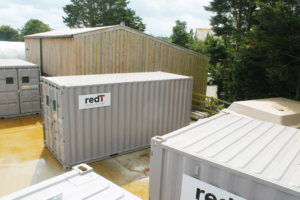 Vanadium redox flow storage companies RedT and Avalon have agreed to complete their merger, subject to shareholder consent. The combined business will be called Invinity Energy Systems.
Vanadium redox flow storage companies RedT and Avalon have agreed to complete their merger, subject to shareholder consent. The combined business will be called Invinity Energy Systems.
RedT was readmitted to the stock exchange this morning, where shares climbed 25 per cent. The company is seeking to raise £7.9m from shareholders to fund growth, which it said it has secured, subject to shareholder approval in April. In total, the firm has total debt and equity funding of £14.9m.
Larry Zulch, proposed Invinity CEO, stated:
“I am delighted that today we have announced the merger of redT and Avalon into what will be called Invinity Energy Systems upon approval at redT’s general meeting on 2 April 2020. Despite the most turbulent market conditions in decades, we were able to secure total debt and equity funding secured of £14.9 million, including the conversion of existing Bushveld debt of $5 million.
“The support of existing investors and shareholders, especially in these market conditions, is a massive vote of confidence. We look forward to delivering on our strategy of creating the world’s leading vanadium flow battery company.”
RedT chairman Neil O’Brien said the merger “creates a world leader in the fast growing, global energy storage market with our proven disruptive alternative to lithium-ion technology.
“Despite the challenging equity market conditions following the coronavirus outbreak, it is testament to the strength of our investment story that we have received major support both from current institutional shareholders and new investors.”
Correction: This article originally stated the firm is seeking a further £7.9m. A RedT spokesperson said the funds have already been raised via conditional placing, subject to approval.
Related stories:
RedT strikes Bushveld deal, gets green light for 5MWh storage unit
EDF and Wärtsilä strike 100MW battery deal
Oxford goes large on storage, EVs and heat pumps
Habitat Energy: 2019 will be “breakthrough year” for battery storage
Pivot Power makes huge play for 2GW battery storage and EV charging network
Flow storage firms RedT and Avalon set to merge
Energy storage ‘will wipe out battery storage’
Click here to see if you qualify for a free subscription to the print edition or to renew.
Follow us at @EnergystMedia. For regular bulletins, sign up for the free newsletter.




flow batteries, vanadium especially, make no sense cost wise. you should investigate properly instead of just copy pasting news releases. Even at today’s low vanadium prices the battery have no chance against LiOn. Yes the tech is better but with 30-40% of the battery cost coming from vanadium they will never be competitive and these producers know this.. May sodium sulpher or non organic flow will have a chance but they are unproven at this stage and sodium sluper is inferior tech.
There is a reason there are no real flow battery projects of size.
Dan
There are 2 aspects you don’t appear to have considered, firstly the life span of VFRB batteries is considerably in excess of LI batteries, common consensus is 25-30 years with no drop in quality through that period. Secondly, LI batteries have a significant fire risk, just google for examples, you would not want a LI battery facility anywhere near you! Vanadium batteries cannot catch fire.
dan tell us about the fire risk on lithium batteries.
Are you aware that the vanadium can be re-used and recycled and that there is a developing market in vanadium leasing which is a market changer
A bit hasty Dan. Expensive technologies see their costs come down and there are many examples of that, while supply of Lithium worldwide is limited; have you considered the much longer life of vanadium flow batteries: at least 25 years versus Li-ion’s useful life which depends on how they are used, but certainly much less than 25 years?